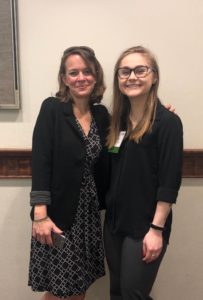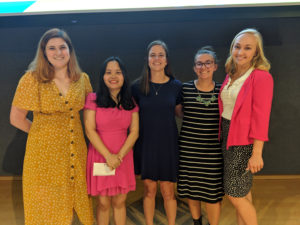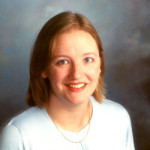
Megan Jacobs ’19 (right) and Associate Professor of Psychological Sciences Hilary Stebbins. Jacobs won one of the two Outstanding Undergraduate Papers awards given to UMW students by the Virginia Association for Psychological Science. Photo provided by Hilary Stebbins.
The Virginia Association for Psychological Science has recognized six University of Mary Washington students with awards for top research papers. The two top awards for Outstanding Undergraduate Papers were awarded to Megan Jacobs ’19 and the five-person team of seniors Kim Bui, Kara Hogue, Sidney McPhail and Corinne Rydgren, and junior Haley Turczynski.
The winning students competed among undergraduates representing 12 Virginia colleges, including James Madison, Virginia Commonwealth and Old Dominion universities. Some 24 undergraduate research papers were submitted.
Jacobs’ research paper “Physiological Differences in Stress Reactivity between Morning and Evening Chronotypes” examined the cardiac activity and cortisol level of people characterized as morning types versus those described as evening types when asked to perform a stressful task in the morning compared to the evening.
According to Associate Professor Hilary Stebbins who supervised the research, Jacobs’ findings suggest that the performance of evening types was impaired in the morning, which might be related to higher morning cortisol levels. “These findings have implications when we consider what we expect from our students, who are heavily skewed towards being evening types, in the morning,” said Stebbins.
The recognition is the second one for Jacobs, who received the outstanding undergraduate paper award last year for research on sleep deprivation as part of a four-member UMW team.

From L-R: Sidney McPhail, Kim Bui, Corinne Rydgren, Haley Turczynski and Kara Hogue at Psi Chi. The five-person team won an Outstanding Undergraduate Papers award from the Virginia Association for Psychological Science. Photo provided by Hilary Stebbins.
The second top prize award went to UMW’s five-person team composed of Bui, Hogue, McPhail, Rydgren and Turczynski for the paper “Error Related Brain Activity and Mindfulness.”
This research team examined the brain activity of people who meditate and people who do not meditate. They studied brain activity while the participants made mistakes to see how strongly they reacted to their errors. The group found that the meditators had a smaller error-related brain component that has been related to the conscious awareness of mistakes. The team also looked at a few variables that might explain why the meditators were reacting differently to mistakes.
“They found that cognitive fusion, which is how much someone fights their own thoughts and inner experiences, explained why there was a relationship between meditator groups and the error-related brain activity,” said Assistant Professor Emily Stanley, who supervised the study.
The winning students also were among undergraduate presentations given at the University’s Psi Chi Symposium held last week in the Hurley Convergence Center’s Digital Auditorium. Jacobs also won the award for Best Presentation for 491/492 teams at the symposium.

